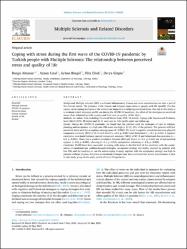| dc.contributor.author | Altunan, Bengü | |
| dc.contributor.author | Ünal, A. | |
| dc.contributor.author | Bingöl, A. | |
| dc.contributor.author | Dilek, Filiz | |
| dc.contributor.author | Girgin, D. | |
| dc.date.accessioned | 2022-05-11T14:07:20Z | |
| dc.date.available | 2022-05-11T14:07:20Z | |
| dc.date.issued | 2021 | |
| dc.identifier.issn | 2211-0348 | |
| dc.identifier.uri | https://doi.org/10.1016/j.msard.2021.103039 | |
| dc.identifier.uri | https://hdl.handle.net/20.500.11776/5066 | |
| dc.description.abstract | Background: Multiple sclerosis (MS) is a chronic inflammatory disease and acute exacerbations are also a part of the clinical course. The presence of the disease and relapses cause stress in people with MS (pwMS). For this reason, stress coping strategies of the patients are important in reducing perceived stress. Our aim in this study is to evaluate which strategies pwMS use during the COVID-19 pandemic, the effect of the strategies on perceived stress, their relationship with relapses and their role on quality of life (QoL). Methods: An online form including Perceived Stress Scale (PSS; 10 items), Coping with Experienced Problems Scale (Brief-COPE; 28 items) and SF-12 were sent to 340 pwMS under our follow-up. Results: During the COVID-19 pandemic, we found that the patients used the strategies of turn to religion, planning and acceptance at a high rate. PSS score was high in 23 (11.2%) of the patients. The patients with low perceived stress used the acceptance strategy more (P=0.008). We found a negative correlation between physical component summary (PCS) of SF-12 and denial (r=-0.2, p<0.001) and distraction (r =-0.1, p=0.04). A negative correlation was found between mental component summary (MCS) of SF-12 and behavioral disconnection (r=-0.2, p=0.006). There was a positive correlation between MCS and humor (r=0.1, p=0.04), use of instrumental support (r=0.2, p=0.009), planning (r=0.1, p=0.04), and positive reframing (r=0.2, p=0.002). Conclusion: PwMS have been successful in coping with stress in the first half of the pandemic with the combination of emotional and problem-focused strategies. Acceptance strategy was highly adopted by patients with low PSS, and the tendency to use the active coping strategy together with the acceptance strategy was high in patients without relapses. Adoption to emotional strategies may have prevented the severe deterioration in QoL in this study group in the early period of Covid-19 pandemic. © 2021 | en_US |
| dc.language.iso | eng | en_US |
| dc.publisher | Elsevier B.V. | en_US |
| dc.identifier.doi | 10.1016/j.msard.2021.103039 | |
| dc.rights | info:eu-repo/semantics/openAccess | en_US |
| dc.subject | Coping strategies | en_US |
| dc.subject | COVID-19 pandemic | en_US |
| dc.subject | Multiple sclerosis | en_US |
| dc.subject | Perceived stress | en_US |
| dc.subject | Quality of life | en_US |
| dc.subject | Relapse | en_US |
| dc.subject | adolescent | en_US |
| dc.subject | adult | en_US |
| dc.subject | aged | en_US |
| dc.subject | Article | en_US |
| dc.subject | behavior | en_US |
| dc.subject | Brief COPE Inventory | en_US |
| dc.subject | controlled study | en_US |
| dc.subject | coping behavior | en_US |
| dc.subject | coronavirus disease 2019 | en_US |
| dc.subject | denial | en_US |
| dc.subject | emotion | en_US |
| dc.subject | female | en_US |
| dc.subject | follow up | en_US |
| dc.subject | human | en_US |
| dc.subject | humor | en_US |
| dc.subject | male | en_US |
| dc.subject | multiple sclerosis | en_US |
| dc.subject | pandemic | en_US |
| dc.subject | Perceived Stress Scale | en_US |
| dc.subject | physiological stress | en_US |
| dc.subject | quality of life | en_US |
| dc.subject | religion | en_US |
| dc.subject | Short Form 12 | en_US |
| dc.subject | Turkey (republic) | en_US |
| dc.subject | Turkish citizen | en_US |
| dc.subject | coping behavior | en_US |
| dc.subject | mental stress | en_US |
| dc.subject | multiple sclerosis | en_US |
| dc.subject | pandemic | en_US |
| dc.subject | quality of life | en_US |
| dc.subject | questionnaire | en_US |
| dc.subject | Adaptation, Psychological | en_US |
| dc.subject | COVID-19 | en_US |
| dc.subject | Humans | en_US |
| dc.subject | Multiple Sclerosis | en_US |
| dc.subject | Pandemics | en_US |
| dc.subject | Quality of Life | en_US |
| dc.subject | SARS-CoV-2 | en_US |
| dc.subject | Stress, Psychological | en_US |
| dc.subject | Surveys and Questionnaires | en_US |
| dc.title | Coping with stress during the first wave of the COVID-19 pandemic by Turkish people with Multiple Sclerosis: the relationship between perceived stress and quality of life | en_US |
| dc.type | article | en_US |
| dc.relation.ispartof | Multiple Sclerosis and Related Disorders | en_US |
| dc.department | Meslek Yüksekokulları, Sağlık Hizmetleri Meslek Yüksekokulu, Sağlık Bakım Hizmetleri Bölümü | en_US |
| dc.identifier.volume | 53 | en_US |
| dc.institutionauthor | Dilek, Filiz | |
| dc.relation.publicationcategory | Makale - Uluslararası Hakemli Dergi - Kurum Öğretim Elemanı | en_US |
| dc.authorscopusid | 57211906388 | |
| dc.authorscopusid | 16069377400 | |
| dc.authorscopusid | 55357599400 | |
| dc.authorscopusid | 57212147478 | |
| dc.authorscopusid | 57224166919 | |
| dc.identifier.wos | WOS:000687405300025 | en_US |
| dc.identifier.scopus | 2-s2.0-85107156932 | en_US |
| dc.identifier.pmid | 34087686 | en_US |



















